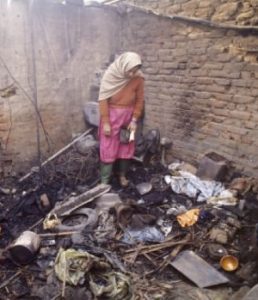![Why are two non-Muslims writing about Ramadan? “Hide behind the couch, son” the father said. The boy squeezed himself in the narrow space as his mother held her four-year old daughter close. This was in India in […]](https://www.bollygroove.com/wp-content/uploads/2017/05/EidFrontCover.png)
“Hide behind the couch, son” the father said. The boy squeezed himself in the narrow space as his mother held her four-year old daughter close.

This was in India in December of 1992. Communal riots had engulfed the country over a land that both Hindus and Muslims claimed as theirs. The country went into a rush of religious fanaticism, leaving thousands of dead and injured lives in its wake.
And yet, in the dark of the night, my Hindu family had opened up its doors to a Muslim neighbor, knowing fully well what the consequences could be. The family of four huddled in our living room while my sister and I (then a teenager) slept with knives under our pillows in case we were attacked by a mob from outside. Around dawn, their house was looted and burned. Smoke rising from it, wiping away everything including their childhood memories, a burning testament of what hate is capable of.
These memories come flocking back as I read about the recent incident in Portland – two innocent lives lost and a third injured to senseless religious animosity. America, the land of the free and home of the brave, is falling victim to the same seeds of hatred.
But that is exactly where the silver lining is – it is still a seed. A seed that if systematically deprived of nourishment will never manage to transform into a sturdy tree with roots deep inside the society.
So how do you deprive this venomous seed you ask? The very first step is to educate ourselves. Ignorance provides the strongest sustenance to that seed. Learn, learn and then learn some more. Over the centuries, religion has intertwined itself with culture to the point of indistinction. Perhaps we can learn to distinguish and recognize the nuances.
And we can educate our kids – young and early. No, I am not talking about the standard textbooks. What if we teach them what it means to live in a multi-cultural society? Teach them how to fight back ignorance with their own knowledge?

With this exact motive in mind, Vivek and I took on our bravest project till date – writing a children’s book on Ramadan and Eid. Are we experts on the matter? Far from it! We spent hours and hours talking to people of the Muslim faith, learning the many different ways people celebrate.
And it was an eye-opening experience for both of us! Growing up, all I associated Eid with was the delicious feasts we would enjoy at my Muslim friends’ homes. Researching more, we discovered how fasting during Ramadan is designed to generate empathy for the poor. What a beautiful concept! What better way to generate compassion for the starving than to first experience it yourself.
Writing about Holi and Diwali was a comfortable endeavor for us but the challenge of writing about a different culture and faith – that’s what made it both exciting and nerve-wracking for us. But that is the point, isn’t it? Step outside of what you know and learn about something that is so horribly misunderstood.
And then maybe, just maybe, someday you will be on a train where not just three people, but the entire train will stand up to a murderer and squash his intentions before they ever materialize.
Ajanta Chakraborty is the co-founder of Bollywood Groove and co-author on Maya & Neel’s India Adventure Series books. Their children’s book on Ramadan & Eid can be found here.